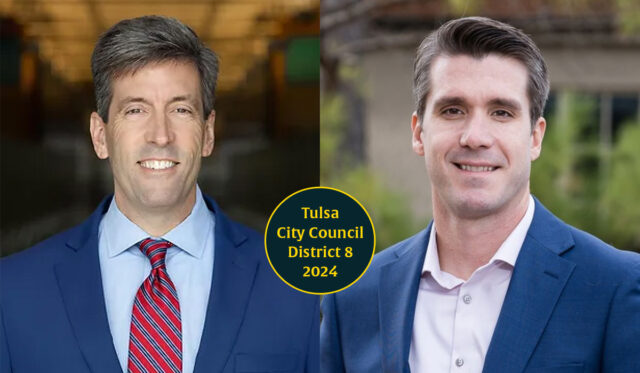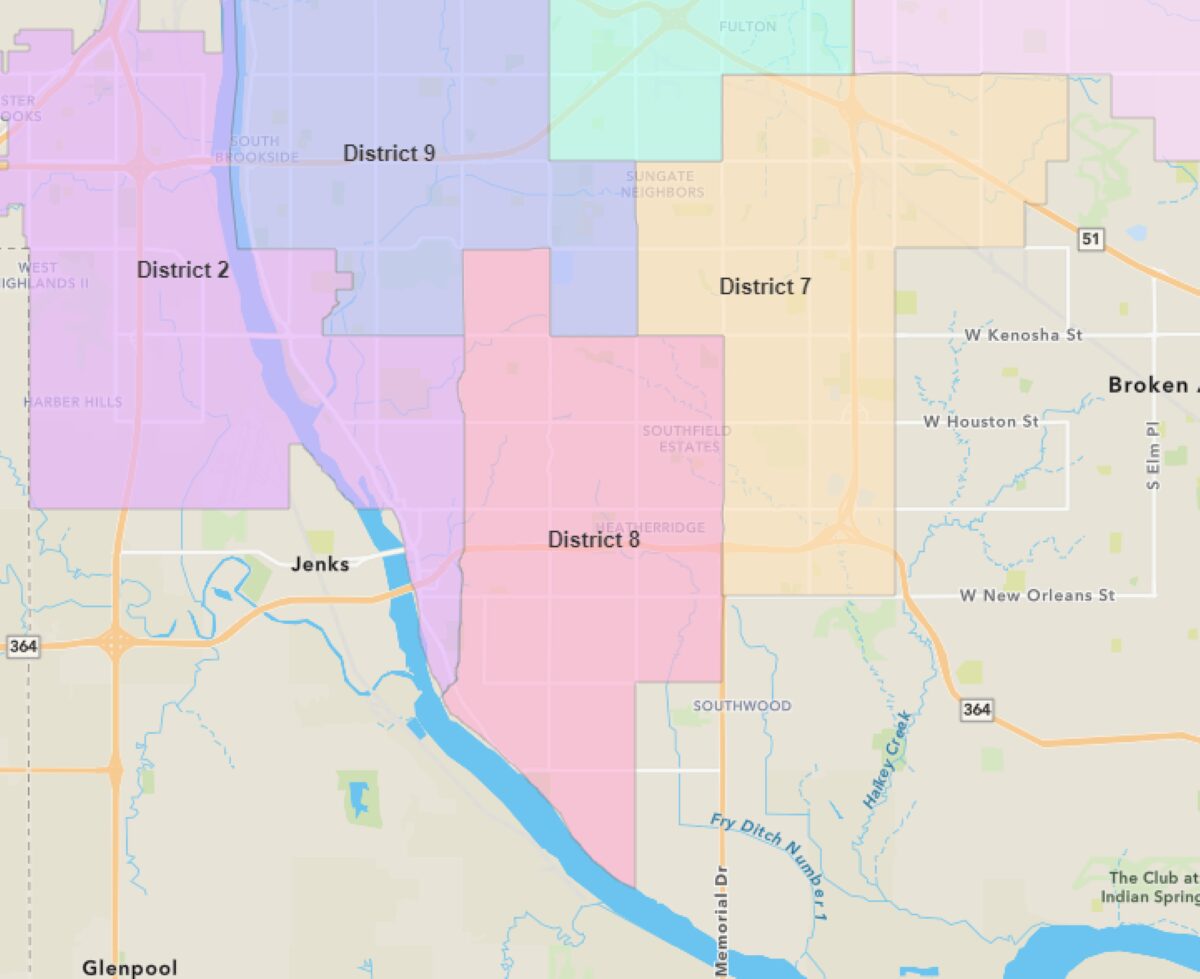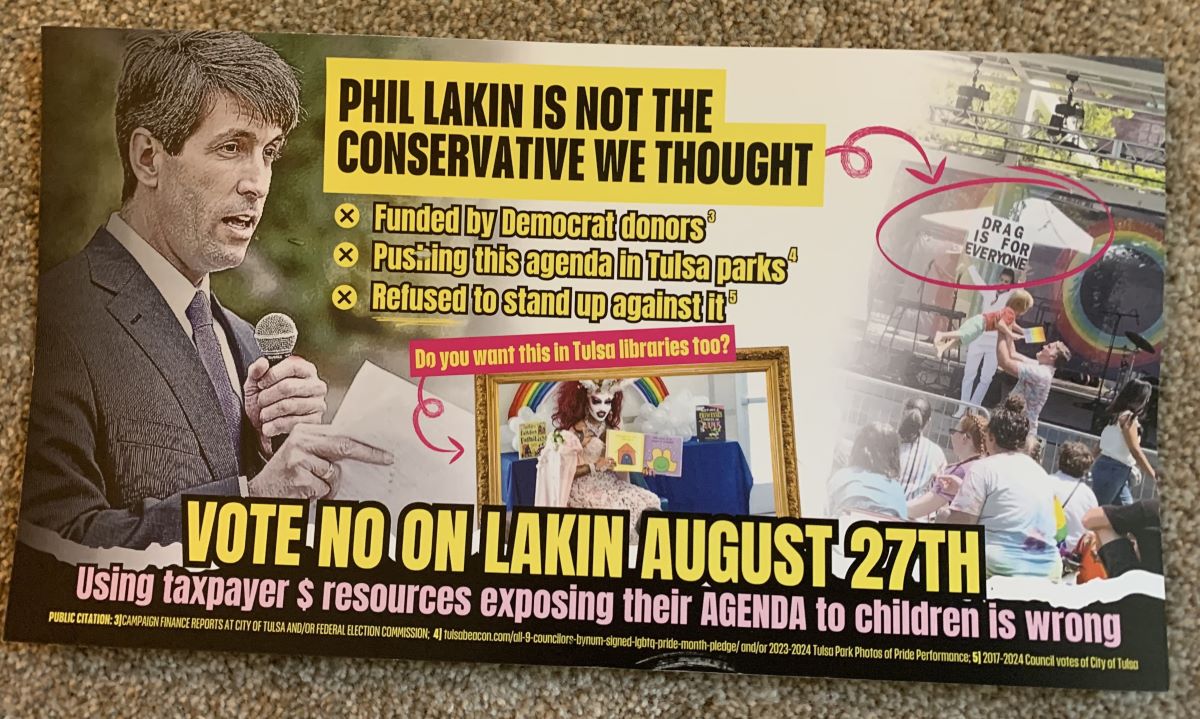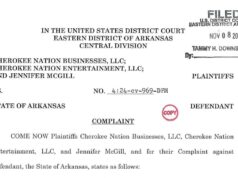

Street money management and mud-slinging mystery mailers have distinguished the race for Tulsa City Council District 8, where long-tenured incumbent Phil Lakin faces political newcomer Chris Cone.
Lakin, who serves as CEO of the Tulsa Community Foundation, has represented south Tulsa’s District 8 since 2011 when he defeated William Suliburk. He ran unopposed in 2014, 2016, 2018 and 2020 before topping Scott Houston in 2022.
Challenger Chris Cone, a first-time candidate, works as a financial planner and has called Tulsa home for the last 10 years. His campaign has centered on infrastructure, public safety and homelessness solutions.
District 8 covers most of south-central Tulsa. Its borders are the Arkansas River to the south, South Memorial Drive to the east, and South Harvard Avenue to the west.
Tulsa features a crowded ballot this election cycle, with nine City Council races, a mayoral election and Tulsa County commissioner runoffs all up for grabs Aug. 27.
Cone critiques street budgeting, Lakin ‘not sure’ why

In an interview, Cone said he chose to enter politics for the first time owing to the “unique perspective” he has gained speaking to his financial planning clients.
“We ask our clients, ‘What is the value of money?’ If you had all the money to go ahead and accomplish that one goal, what is most important? A lot of it comes back to the type of impact that you want to have, whether it be on your immediate family, your extended family, your community or your city,” Cone said. “Very few people have a desire for things outside of just being able to give back and being able to watch their families grow or helping others.”
That desire to help the community has “always been in” his heart, Cone said, and it drove him to file for Tulsa City Council District 8. The conditions of the actual drive to the filing office are another reason he’s entered the race.
Cone identified street widenings, traffic signal and lighting installations, and improving intersection safety as his top priorities.
“Our incumbent, he talks about road-widening projects, but in his tenure, we’ve only had maybe four or five miles expanded that are directly in our district, and then when you go south past 91st Street, it gets worse and worse and worse,” Cone said.
Cone argued that the Yale Avenue widening project, which Lakin has touted as a success in the district, finished about $6 million over budget and months behind schedule. However, publicly available records fail to fully support Cone’s claim.
While the project was delayed from its original fall 2023 completion timeline, The Tulsa World and the City of Tulsa reported the original engineers’ estimate was approximately $40 million. The Tulsa World noted the project finished at a cost of $31 million, about $9 million below that mark. Previous reporting suggested the project would cost around $37 million.
Lakin, who is positioned to become chairman of the Tulsa City Council if he is reelected, maintained that the project was always budgeted at a maximum of $40 million, but the final cost of the project fluctuated with changes to scope of work.
“He said [the project was over budget] several times. He refers back to a Tulsa World article, but he’s never shown me the article, so I don’t know,” Lakin said. “I’m not sure what he could be seeing or remembering, but $40.08 million was the engineers’ estimate for this project. The city council, with change orders, approved a contract for $29.25 million, and we think with change orders and other things, that will go to $31 million.”
Like Cone, Lakin said improving the district’s infrastructure remains a top priority. Both candidates recognized that roads in District 8 have struggled to accommodate its recent population spike.
In an interview, Lakin touted his efforts to get more street-widening projects on the calendar, including capacity improvements at 81st Street, on Sheridan Road between 81st and 91st streets, and at the intersection of 101st Street and Sheridan.
“We have to continue to widen our streets so that the volume-to-capacity ratios are normalized. Right now, many of our streets are graded at an F,” Lakin said. “In fact, if you take the streets that are over volume-to-capacity for District 8, and look citywide, District 8 has more volume-to-capacity issue roads than all the other districts combined.”
Cone agreed, adding that time spent sitting in traffic over long periods could add up to losing “days of our lives.”
Cone also criticized other city projects that did significantly eclipse original budgets, like renovations to the Gilcrease Museum, which are ongoing.
“I mean, this is what we should all be asking,” Cone said. “Where is the accountability? Where is the leadership?”
Mystery mailers lambast Lakin

While municipal elections in Oklahoma are nonpartisan races, a recently created political action committee has taken aim at Lakin over party identities. Mailers distributed by “Fed Up Conservative Families PAC” have labeled him a “liberal politician” while hailing Cone as the “Republican choice.”
The materials criticize Lakin for supporting the city’s 2022 Pride Month proclamation and having registered Democrats as campaign donors.
Lakin brushed off the Fed Up Conservative Families PAC’s critical mailers as typical dark-money politics.
“They chose an acronym that, maybe it was intentional, maybe it wasn’t, but it does almost spell a cuss word,” Lakin said. “The same PAC sent three mailers.”
The mailers also note Lakin was one of six council members to vote against a proposed ordinance that sought to keep city funds from aiding undocumented immigrants. Critics of the proposal said it would have seriously complicated the city’s ability to support charities that don’t ask people for identification, like the community food bank and churches.
On his campaign Facebook page, Cone said the mailers were not approved by him or associated with his campaign. He emphasized that his campaign was focused on winning “on merit,” not mud-slinging.
“If you’re like me, you may have received a mailer this past week depicting my opponent and denigrating members of our community,” Cone wrote Aug. 10. “I can assure you this was not done by me, nor anyone in my campaign. I received one of these in my mailbox too, and it was authorized by an independent PAC completely unaffiliated with my campaign.”
Paperwork was filed for the PAC’s creation July 31, and it was amended Aug. 13. The PAC lists an address in Tulsa, although the chairperson and treasurer of the organization, referenced only as “G. Harjo,” is listed under a Stillwater address. Underscoring the controversial nature of dark-money political action committees, the unidentified G. Harjo also appears as the registered chairperson and treasurer for the Advance Right PAC, which opposed the reelection campaign of ousted Senate Floor Leader Greg McCortney (R-Ada) in June.
Both the Stillwater and Tulsa addresses reference mailbox facilities. The FUCF PAC’s bank address is also in Stillwater.
Cone, Lakin seek private-public homelessness solutions
Cone and Lakin each emphasized their desire to address Tulsa’s homelessness issue through joint efforts between city and private entities.
“The longer city projects go on, the less accountability there tends to be, because it gets farther away from the original source, the original passion,” Cone said. “I’m not saying the city needs to be giving all churches and charitable organizations [that deal with homelessness] $100,000, but I’m saying because they know where the needs are and where it can be most impactful, we should be relying on their expertise more than our own.”
Public-private partnerships have become increasingly common tools that cities use to address homelessness and affordable housing, typically through municipalities offering resources or land use to private organizations and charities.
Cone said local charities can stretch funds farther than the city. They are also more adept at identifying different segments of the homeless or at-risk population, he said, avoiding the “dangerous presumption” of lumping all homeless people together as a monolithic population.
“At-risk women and children, they need to be moved to the very front of the line to get the resources that they need,” Cone said. “Then we need to go ahead and define the mental health space and the addiction space, because you can’t treat those with mental health issues the same way as addicts or at-risk women.”
A more efficient path to addressing homelessness would involve city support of individual charities and programs tailored to meeting different needs, Cone said.
He added that assuming all homeless Tulsans are seeking assistance might not be helpful.
“By saying that, you’re disenfranchising the individuals that want to be homeless,” Cone said. “There are a group of people where that is their life choice — to be off of the grid, and they don’t want handouts. They’re not looking for a job. They’re not looking for people’s sympathy.”
Lakin said through a variety of public-private partnerships, temporary hotel room programs and new shelters, about 2,000 Tulsans have found shelter during his current term. Like Cone, he said some homeless Tulsans may not want to seek city support.
“We have 1,400 others that need homes. Many of those want homes. Some of them have addictions that need to be treated,” Lakin said. “Some don’t want homes and want to just live on private property and live in other places, so we’re trying to make available homes for those who want them.”
During Lakin’s tenure, the mayor and city council have budgeted $75 million to partner with private and philanthropic organizations to construct shelters and affordable housing “blended with market rate housing” in Tulsa.
The city also chose the location for a new low-barrier shelter in partnership with the City Lights Foundation this summer. A low-barrier shelter means there would be no reason a person would be disqualified from entry, such as criminal history or pet ownership, which can bar entry to other shelters.
After more than a decade in office, Lakin said he remains the best candidate for the job owing to his experience in leadership and the institutional knowledge he has retained.
“I know that leadership matters, and I know that tenure matters. We’re going to end up with a new mayor and at least three new councilors this time, and I’ve proven that I can work to build consensus,” Lakin said. “I’m set to be the chair of the council starting this December, and as chair, it gives me and my constituents the opportunity to be in every important, strategic meeting with the new mayor.”
Cone, meanwhile, argued that Tulsa is on the right track, but needs a “touch up” and change from the status quo to reach its potential.
“I want everybody to know that I’m here to represent my district, District 8, and their needs. My desire is to always be a resource to people and provide value. That will be no different as city councilor,” Cone said. “I’m a straightforward kind of guy, what you see is what you get. I’m very open, and I’m very honest with people, and that’ll be no different.”




















